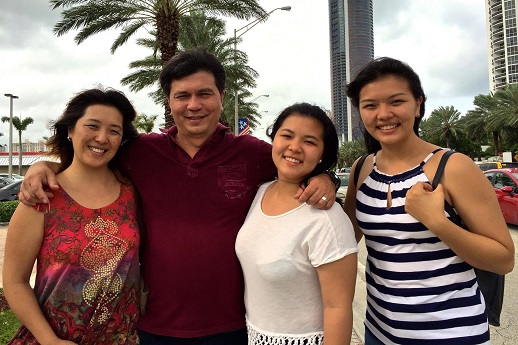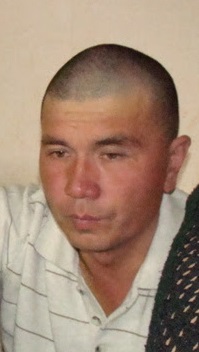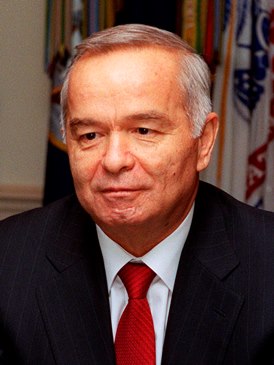
Finally, their journey is over. Three years since fleeing Uzbekistan – following four years in a labour camp, house arrest and death threats – Pastor Dmitry Shestakov has arrived in the United States, where he and his family have been granted asylum.
It’s been almost 10 years since Shestakov was first detained, after a raid on his Full Gospel Church in Andijan, south-eastern Uzbekistan. The date was 21 January, 2007. Four years to the day later, he was released.
Shestakov had been found guilty of two offences: the organisation of religious groups and manufacture/distribution of materials that “threaten social safety and public peace”.
He was sent to a prison camp in central Uzbekistan, 450 miles from his home, making it difficult for his wife, Marina, and three daughters, Maria, Alexandra and Vera, to visit.

When eventually he was released, only two church members went to collect him.
“No-one else dared to come, because they’re afraid to attract unwanted attention due to their connection with him,” a charity worker with Open Doors, which advocates for Christians like Shestakov, said afterwards. Their name was withheld to protect their security. “Pastor Dmitry has to be very careful and everything he does will be strictly monitored. This includes the people he will be talking to, everything he says, everywhere he goes, and much more.”
Shestakov himself said he had been “ordered to follow strict guidelines and regulations”.
He added: “I am a pastor and I want to serve God, but I have to find a wise way to do this.”
But two years later it became apparent that staying in Uzbekistan was no longer possible. After being made to ask the police for written permission to leave his house, and then receiving death threats, Dmitry Shestakov took his family to Ukraine, where they were granted refugee status by the United Nations Human Rights Council.
Then, after another three years, on Tuesday 30 August, Dmitry, Marina and their two youngest daughters – Alexandra (20) and Vera (16) – landed on US soil. They will live in Miama, Florida. (Their eldest daughter, Maria, 22, is now married and has stayed in Ukraine with her husband.)
But challenges still lie ahead for the family, according to Sergey Rakhuba from Mission Eurasia, which hopes to raise $10,000 for them to help their transition. He said the money will go towards rent, food, furniture, clothes and transportation.
“After nine years of hardships, the family is arriving with nothing – no money, no housing, and precious few possessions,” Rakhuba said.
What is life like for Christians still in Uzbekistan?
Uzbekistan hit the world headlines this week, after long-standing President Islam Karimov was reported to have died. Some confusion still surrounds the situation. Karimov, who has been President since before the country’s independence from Soviet rule in 1991, reportedly suffered a brain haemorrhage. However, his daughter has asked for the speculation surrounding his condition to end, while a government announcement on 28 August suggested he may recover after “a certain period of time”. Now they say he is “critically ill”. In March last year, Karimov was re-elected to a third term, even though the constitution limits presidents to two terms.

Uzbekistan is by far the most populous Central Asian country, with more than 30 million people – twice as many as the second-largest country in the region, Kazakhstan. It is generally considered to have the most restrictive laws in Central Asia. Sanctions on religious literature are particularly stringent. Religious books must be read in designated areas only, such as registered church buildings. Fines are hefty and regularly issued.
At No. 15, Uzbekistan is the highest-ranked Central Asian country on Open Doors’ 2016 World Watch List, which ranks the countries in which it is most difficult to be a Christian. Karimov’s regime has been accused of serious human rights abuses, including the systematic use of torture. Uzbekistan has been a “Country of Particular Concern” for the United States Commission on International Religious Freedom since 2005.
Open Doors estimates there are around 210,000 Christians in Uzbekistan, but during the last decade not a single church has been able to register. Unregistered religious activity is outlawed, while even registered churches, such as the Full Gospel Church, face pressure from the authorities.
Uzbekistan is officially a secular state, although around 90% of the population is Muslim. Almost all of Uzbekistan’s Christians are from ethnic minorities. Under Uzbek law, it is illegal to try to persuade someone to change their religion.
“Many Christian families and pastors in Uzbekistan and Central Asia are risking everything – jobs, families, and even their very lives – to boldly preach … in regions hostile to Christianity.”
Rakhuba says there have been a “rising number of arrests, raids, imprisonments, and threats to religious freedom” across Central Asia.
“Many Christian families and pastors in Uzbekistan and Central Asia are risking everything – jobs, families, and even their very lives – to boldly preach … in regions hostile to Christianity,” he added.
In July, World Watch Monitor reported that the “paranoia” of Central Asian leaders over the threat of Islamism was also affecting Christians.
“To an even greater extent than its neighbours, Uzbekistan effectively whitewashes all distinctions of Islamic activity not government sanctioned as radical and terrorist,” according to an Open Doors report written by consultant risk analyst Mark McNamee.
“The Karimov regime is particularly paranoid and security-minded due to the large potential for unrest on account of the comparative large size in Central Asia … [its] greater ethnic diversity, and the independent development of jihad within its territory.
“Uzbekistan’s Islamists in the 1990s saw in the Tajik Civil War an opportunity for jihad and participated in that war aligned with the Islamic Renaissance Party of Tajikistan, as they were powerless to struggle for Islam in their own country. In the aftermath, [they] rejuvenated themselves in the Ferghana Valley of Uzbekistan, from whence sprang the Islamic Movement of Uzbekistan and Hizb ut-Tahrir, both of which have officially sought the overthrow of the Karimov regime to be replaced by a caliphate. Both groups have effectively been extinguished in the region, with IMU regrouping in northern Afghanistan and the Afghanistan/Pakistan border region and most recently subsuming itself to IS.”